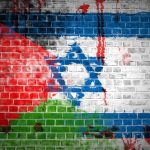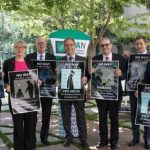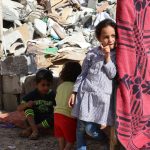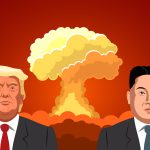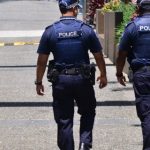Australia Justifies Atrocities Against Palestinians
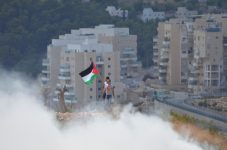
Israeli warplanes struck dozens of targets throughout the Gaza Strip on Tuesday, in response to a barrage of rockets and mortar shells fired upon southern Israel by Palestinian forces. This is the greatest escalation in fighting between the two sides since a 2014 war devastated the region.
The conflict follows the killing of 58 unarmed Palestinian protesters in a single day in mid-May. The demonstrators were gathered along the border of Gaza demanding the right to return to their homes inside what is now Israel.
The Great March of Return rally attracted 30,000 demonstrators. Since the mass protest began on March 30, more than 118 Palestinians have been killed inside the blockaded Palestinian enclave.
On May 14, at the same time Israeli forces were killing dozens of Palestinian protesters and injuring over 2,700 more, US president Donald Trump’s daughter Ivanka and her husband Jared Kushner were presiding over the opening of the US embassy in Jerusalem just 70 kilometres away.
Trump announced that the US was set to officially recognise Jerusalem as the capital of Israel back in December last year. It’s a move that every other US president for the last 20 years has refused to make, as both Palestinians and Israelis claim the city as their capital.
And it was lost upon no one, that the opening ceremony of the US embassy was conducted on the day prior to the 70th anniversary of the Nakba – the “catastrophe” in Arabic – that took place in Palestine.
A history of dispossession
In the late 1940s, over 750,000 Palestinians were forcibly displaced from their homes and pushed into refugee camps in the West Bank, the Gaza Strip, East Jerusalem and neighbouring countries.
Known as the Nakba, Palestinians mark this dispossession on May 15, the date the state of Israel came into being in 1948.
The Israeli state was declared on May 14, the day the British ended their mandate in Palestine. Britain began its occupation of the nation after the First World War. And in the 1917 Balfour Declaration, the British pledged to establish a “national home for the Jewish people” in Palestine.
Due to the influx of Jewish immigrants from Europe, the people of Palestine revolted in 1936. The British quelled the revolt by 1939, and it also began limiting Jewish migration. In response, Jewish people formed their own forces and turned on the British, which eventually led to their pull out.
The large-scale dispossession of Palestinians, and the atrocities perpetrated against them in the process, began in 1947 and carried on through until the end of the first Arab-Israeli war in 1949. Surrounding Arab nations declared the war against Israel with the aim of liberating Palestine.
Today, the catastrophe still impacts more than 12 million Palestinians who remain stateless. And atrocities, like those carried out on the day the US embassy opened, continue to be perpetrated against them.
Derailing the peace process
“Palestinians have marked 70 continuous years of Nakba – of dispossession and exile,” said Bishop George Browning, president of the Australia Palestine Advocacy Network. “The last month has been horrendous for Palestinians and for all who yearn for peace and justice.”
The Bishop explained the decision to relocate the American embassy to Jerusalem was done following the repeated declaration by Israeli prime minister Benjamin Netanyahu that the city “is the eternal and undivided capital of Israel.”
At the embassy opening, Netanyahu reiterated this declaration, which almost no other country recognises. The UN Security Council resolution 478 condemns Israel’s 1967 annexation of East Jerusalem and calls for a compromise solution.
“Thus, it was a decision that pre-empts a final peace solution, undermines 50 years of international law, and was done at the start of Ramadan and the anniversary of Palestinian dispossession,” Bishop Browning told Sydney Criminal Lawyers®.
“It was in fact a conscious act designed to dispel hope of Palestinian self-determination,” he made clear.
The stranglehold on Gaza
One of the most densely populated areas in the world, the Gaza Strip operates today as a “giant open prison” camp. Since Israel withdrew its military presence in 2005, Gaza has been subject to an Israeli commercial goods blockade, reducing access to food, electricity and medicine.
A 2017 United Nations report outlined that the 2 million people living in Gaza are down to two hours of electricity a day, youth unemployment is at 60 percent, and the region’s only water source will be “irreversibly-depleted” by 2020.
The protesters who converged along the border with Israel were not only calling for their right of return, but also for an easing of the blockade. And for this, many paid with their lives.
“With most of the world, we were sickened by Israel’s use of disproportionate force against protesters in Gaza,” Bishop Browning said. He added that within a six week period more than 100 Palestinians were killed, but there have been no reports of “Israeli deaths or even injury.”
Ensuring violations go unchecked
Following the massacre of the Gaza protesters, the United Nations Human Rights Council held a special meeting on May 18 to discuss the “deteriorating human rights situation in the occupied Palestinian territory, including East Jerusalem.”
Twenty nine countries voted in favour of an independent investigation into the human rights violations in Gaza. However, two countries voted against the measure: the United States and Australia.
The notes of the meeting revealed that Australia “expressed deep sadness and regret about the loss of life and injury” that occurred at the protest. However, it believes that “Israel had legitimate security concerns.”
According to Bishop Browning, when Australia refused to condemn “Israel’s punitive disregard for civilian life,” and “joined the US as the only country to vote against a resolution,” it exposed this nation’s human rights credentials as “void.”
The United States has long been Israel’s strongest supporter. Over the years, the US has given Israel $118 billion in aid. And half of all the UN Security Council vetos America has issued have blocked resolutions critical of Israel.
Renowned political commentator Noam Chomsky has suggested that the reason the United States, Australia and Canada have been Israel’s most consistent supporters is that all four nations are of settler-colonial origins, which makes them natural allies.
Domestic atrocities
Australia won its seat on the United Nations Human Rights Council in October last year. At the time, critics questioned the move as the nation is failing to meet the basic human rights standards for First Nations people.
Following the win, the Turnbull government subsequently shutdown the detention centre on Manus Island causing a humanitarian crisis. And now Canberra has justified the recent killings in Gaza, as Israel “had the right to protect its citizens” against peaceful protesters on the other side of the wall.
Bishop Browning stressed that the “passivity” shown by Australia “in the face of clear human rights violations” is undermining any chance of a two-state solution, which the nation supposedly supports.
“This passivity gives comfort to Israeli interests that want Palestinians to remain forever a disposed people, and in the process offers no hope of genuine security to Israel itself,” the Bishop concluded.



